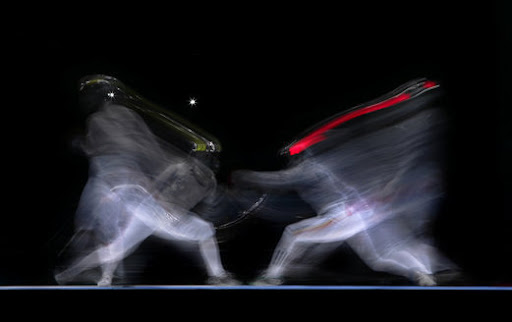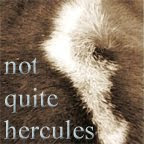The sword was to be far more than a simple weapon;
it had to be an answer to life's questions.
-Eji Yoshikawa
it had to be an answer to life's questions.
-Eji Yoshikawa
I don't know how many of my blogger readers know that I was a fencer. At soul, I still am. I started in high school, lucky enough to have an after-school club devoted to fencing. I learned modest foil, as do most people just starting out, and while I never had the best form or patience for every tilt, I had a passion for the length of steel fixed in my hand. And a fierce aggression for demonstrating it.
In college I learned that my university had a varsity fencing team. I had never considered myself a competitive fencer--my competitive nature was reserved for equestrian, but it did mean that I could fence. Again, I started out as a member of the foil team, a large group of crazy, generally high-cultured bunch of dorks (I say so very lovingly). Fencers are interesting people, if you haven't known any yourself. And how can they not be, when you get academics and intellectuals who love to hit each other with metal then squabble over right-of-way and whether or not that slip of footing cost you the touch. Even as the eccentric pagan who growled at people, I fit in very easily.
My first two tournaments went relatively well. My technique was still a bit loose and overly aggressive, but in that respect I won a few bouts simply because I was fast and easily intimidated my opponents. Then our sabre coach stole me and I found my rightful place, where speed and a mix of well-played aggression and tactics reigns. Where touches are won in a matter of seconds and a simple, ill-timed blink can cost you the whole bout.
I loved it--I still love it. I miss it terribly.
One of my last tournaments, held at Notre Dame where the fencing takes place in the same building as the hokey rink, did not exactly go well. It was a qualifying event for regionals (and nationals), which meant that it featured team as well as individual matches. I had a cold, aggravated by the rink next to us, and by my body's intense dislike of prednisone (I was on it by doctor's orders for my tendinitis and arthritis, which was slowly robbing me of all my favorite activities, let alone basic function such as holding a pen without pain). In result, my legs turned completely blue and numb. I worried my coaches and teammates, but refused to give up on the tournament. Especially because I was to bout against Olympic gold-medal fencer Mariel Zagunis.
I expected a bout lasting no longer than twenty seconds. Fifteen touches, because it was an individual match. I expected to look like a stuffed fencing dummy compared to her. (I did, really.) And yet, somehow, I got two touches against her. One was simple, I retreated from her advances, went to block to my inside, did it sloppily enough that, while successful, wobbled my whole blade enough to brush the sleeve of her lamé. I don't even remember the second one. Every move of hers was a flash. I lost, not exactly standing still, but still immensely overpowered by her skill. Still, it's awesome to be able to say that I fenced against her.

I took most of Junior year off simply for the sake of my wrist, only going to practices once in a while. Though every time I did I felt more and more frustrated. My hand hurt all the time. My footwork got sloppy because I could hardly concentrate on anything other than my grip. I could feel the disappointment from the coaches, echoed by every strained smile and every drill we repeated. I felt distant and alienated from my teammates, especially because nearly all my close teammates had already graduated. When the summer before my Senior year brought my riding accident, it also stole the hope I had had about getting back in shape to join the team again. I needed time to recover, not to test whether or not quitting the flute allowed my wrist to heal enough for my sabre.
In college I learned that my university had a varsity fencing team. I had never considered myself a competitive fencer--my competitive nature was reserved for equestrian, but it did mean that I could fence. Again, I started out as a member of the foil team, a large group of crazy, generally high-cultured bunch of dorks (I say so very lovingly). Fencers are interesting people, if you haven't known any yourself. And how can they not be, when you get academics and intellectuals who love to hit each other with metal then squabble over right-of-way and whether or not that slip of footing cost you the touch. Even as the eccentric pagan who growled at people, I fit in very easily.
My first two tournaments went relatively well. My technique was still a bit loose and overly aggressive, but in that respect I won a few bouts simply because I was fast and easily intimidated my opponents. Then our sabre coach stole me and I found my rightful place, where speed and a mix of well-played aggression and tactics reigns. Where touches are won in a matter of seconds and a simple, ill-timed blink can cost you the whole bout.
I loved it--I still love it. I miss it terribly.
One of my last tournaments, held at Notre Dame where the fencing takes place in the same building as the hokey rink, did not exactly go well. It was a qualifying event for regionals (and nationals), which meant that it featured team as well as individual matches. I had a cold, aggravated by the rink next to us, and by my body's intense dislike of prednisone (I was on it by doctor's orders for my tendinitis and arthritis, which was slowly robbing me of all my favorite activities, let alone basic function such as holding a pen without pain). In result, my legs turned completely blue and numb. I worried my coaches and teammates, but refused to give up on the tournament. Especially because I was to bout against Olympic gold-medal fencer Mariel Zagunis.
I expected a bout lasting no longer than twenty seconds. Fifteen touches, because it was an individual match. I expected to look like a stuffed fencing dummy compared to her. (I did, really.) And yet, somehow, I got two touches against her. One was simple, I retreated from her advances, went to block to my inside, did it sloppily enough that, while successful, wobbled my whole blade enough to brush the sleeve of her lamé. I don't even remember the second one. Every move of hers was a flash. I lost, not exactly standing still, but still immensely overpowered by her skill. Still, it's awesome to be able to say that I fenced against her.
I took most of Junior year off simply for the sake of my wrist, only going to practices once in a while. Though every time I did I felt more and more frustrated. My hand hurt all the time. My footwork got sloppy because I could hardly concentrate on anything other than my grip. I could feel the disappointment from the coaches, echoed by every strained smile and every drill we repeated. I felt distant and alienated from my teammates, especially because nearly all my close teammates had already graduated. When the summer before my Senior year brought my riding accident, it also stole the hope I had had about getting back in shape to join the team again. I needed time to recover, not to test whether or not quitting the flute allowed my wrist to heal enough for my sabre.
The Way of the Sword and the Way of Zen are identical,
for they have the same purpose--that of killing the ego.
-Yamada Jirokichi
Moving on from my overly long life's story, I find the above quote to be completely true. Most athletes experience a "zone" effect, where the world around them loses focus and things just seem to click together. I experience that in riding. I experienced that during the best bouts of my short fencing career. Air and floor became energy, and I the electricity that moved between them, my feet drawn to exactly the right places and my blade moving as swiftly as my gaze. The mind and the body's breath and pulse removed from necessity. All actions fold together into a rhythm, a dance. You can read every possibility within a second and control which becomes reality. The successful fisherman is not adept at catching fish. The successful fisherman is a part of the river, a part of his line and hook, a part of the fish caught upon it. The successful fisherman is the fish; there is no difference between them. Likewise, the fencer is the blade and their movement. Energy. There is no difference between them.
for they have the same purpose--that of killing the ego.
-Yamada Jirokichi
Moving on from my overly long life's story, I find the above quote to be completely true. Most athletes experience a "zone" effect, where the world around them loses focus and things just seem to click together. I experience that in riding. I experienced that during the best bouts of my short fencing career. Air and floor became energy, and I the electricity that moved between them, my feet drawn to exactly the right places and my blade moving as swiftly as my gaze. The mind and the body's breath and pulse removed from necessity. All actions fold together into a rhythm, a dance. You can read every possibility within a second and control which becomes reality. The successful fisherman is not adept at catching fish. The successful fisherman is a part of the river, a part of his line and hook, a part of the fish caught upon it. The successful fisherman is the fish; there is no difference between them. Likewise, the fencer is the blade and their movement. Energy. There is no difference between them.





